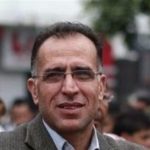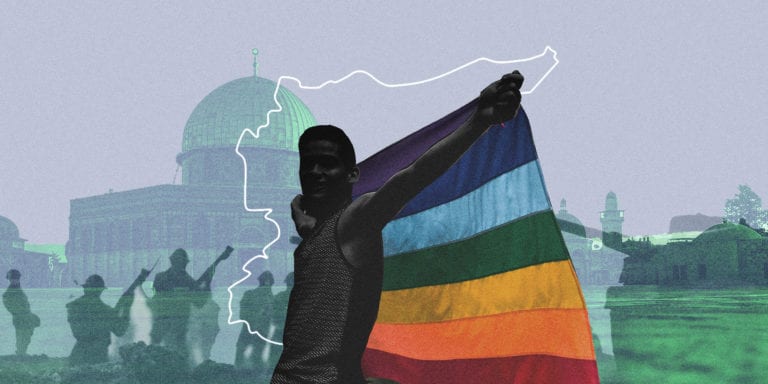On Saturday morning, May 21, we returned to work. The office was not damaged. My colleague, and friend, Hazem was still afraid. Several missiles landed near his house, forcing him to descend from his apartment on the 6th floor to the one of his mother on the 2nd, where he and his three brothers and their families met. Hazem is still afraid, as one missile landed in an empty space next to the family home, yet did not explode.
The battle has ended. And the Palestinians celebrated their victory over themselves before celebrating their victory in deterring the aggression, achieving results they deemed important. First of all: national unity and returning the Palestinian cause to the fore. Secondly: the ability to hurt Israel, despite the latter’s media machine dedicated to murder, destruction and misinformation.
The Gaza municipality and several youth groups launched an initiative called: “We give it a lifetime.” The next morning I stood in front of the Sunrise Tower in Al-Rimal, and saw children, youngsters and women starting to clean the streets.
As soon as the truce was announced, the people of Gaza, began to assess their conditions with one question on their minds was: what next? Who will compensate the people and rebuild the destroyed homes and infrastructure, amidst an absence of justice, while the siege and division continue?
The United Nations estimate that 107,000 citizens were displaced from their homes, 71,000 of whom sought refuge in UNRWA schools, while the rest fled to the homes of friends and family.
Umm Abdullah
On the 2nd day after the truce, I visited some of my cousins and aunts in the north, to congratulate them for Eid al-Fitr, which we did not celebrate this year due to the aggression, as well as to console them, as one relative had died in the war. Someone from my village, Barbar, had been killed too, while his brother was seriously injured.
Umm Abdullah, a school principal working for the United Nations Relief and Works Agency for Palestinian Refugees (UNRWA), told me that her family consists of 6 members and that her house was severely damaged during the Israeli attack. She sought refuge in her father’s house in Jabalia camp on the 3rd day of the violence. Some 30 people had gathered there, in addition to the actual residents.
The Israelis then warned the owners of the house next to her father’s, two meters away, that their home was about to be destroyed, so Umm Abdullah and her entire family were forced to evacuate again. About half an hour later a war plane bombed the house. It was gone in less than a minute.
My daughter Yafa’s friend Nour saw her third brother killed in the recent airstrikes. The first fell in the Al-Aqsa intifada. The second was killed in the 2009 aggression.
Dr. Saed, a university professor, saw the house next to his bombed. He did not hide his fear and anxiety. The signs of shock featured prominently on his face, as he talked extensively about the psychological effects of the war, about the scars created for him, his family, and the people of Gaza in general.
War Crimes
While the United Nations have started to publish their war statistics, the Gaza Government Information Office announced that 2,075 housing units were completely and 15,000 partially destroyed as a result of the Israeli aggression.
A Jewish friend, who followed her daughter and left Israel for Europe years ago, calls me daily to reassure me, express her solidarity and condemn the Israeli attacks. She considers them war crimes. She does not even hide her happiness when the bombing of Gaza is followed by the bombing of Tel Aviv.
Friends and relatives, whom I visited following the ceasefire, all talk about the reasons for targeting the al-Rimal neighborhood in Gaza and destroying such landmark features as the Al-Shorouk, Al-Galaa and Al-Jawhara towers.
These towers, and others, were like olive trees planted in the upscale area. They occupation authorities deliberately destroyed them. The discussion then focused on Israeli intelligence officers warning people to leave before their homes got destroyed, giving the impression they know everything about the details of their lives.
There was a certain keenness to prove the ability of Israeli intelligence to know every detail of people lives: their place of residence, their neighbors, the number of family members in the house, names, ages, who married who, who did not marry, and who had died. The people of Gaza know that the Palestinian population registry is linked to the occupation state.
ID cards, birth and death certificates are all found in Israeli records as well. With one click of a mouse all such details appear. This was stipulated in the Oslo Accords, and the Palestinian Authority has not worked on canceling this, which grants Israel access to every personal detail of every Palestinian.
Of course, Israel possesses high-tech capabilities to spy, and penetrate mobile phones. Reconnaissance aircraft never leave the sky of Gaza and monitor every movement. And Israel has its agents on the ground. And yet, this aggression, and what preceded it, revealed that Israel did not succeed in knowing many details and it made many mistakes In the bombing of houses, it deemed “wanted.”
On Sunday morning, my friend Nour came to visit. We recalled her horror and fear for her husband when Israel bombed the building next to the press office where he happened to be, as he was heading to the editor of a news site. Only one hour after the bombing had stopped, he was able to leave with help of the Red Cross.
Nour added that, despite the end of the aggression, her 13-year-old daughter Alia refuses to go back to sleeping in her own room. She prefers the hallway. According to Nour, most residents of the Gaza Strip prefer to sleep near the doors of their apartments.
In the coming days, a discussion will be held open about the reconstruction. What party will be responsible for it? Who will supervise and monitor the reconstruction and all pending issues, most importantly: the victims file and the failure of the Palestinian Authority (PA) to bear responsibility, as it has refused to register the some 1,400 people who were killed in the 2014 aggression in the Martyrs and Wounded Foundation.
For the PA the matter is simple: “Let Hamas pay them.”
Read Also:







